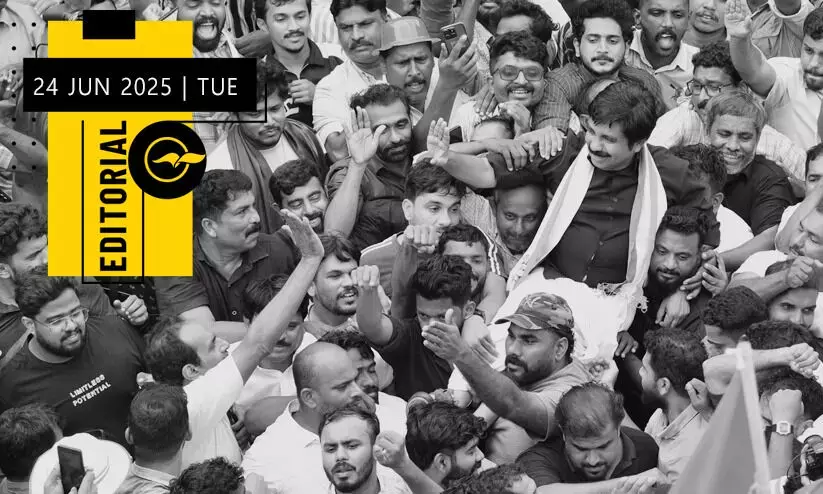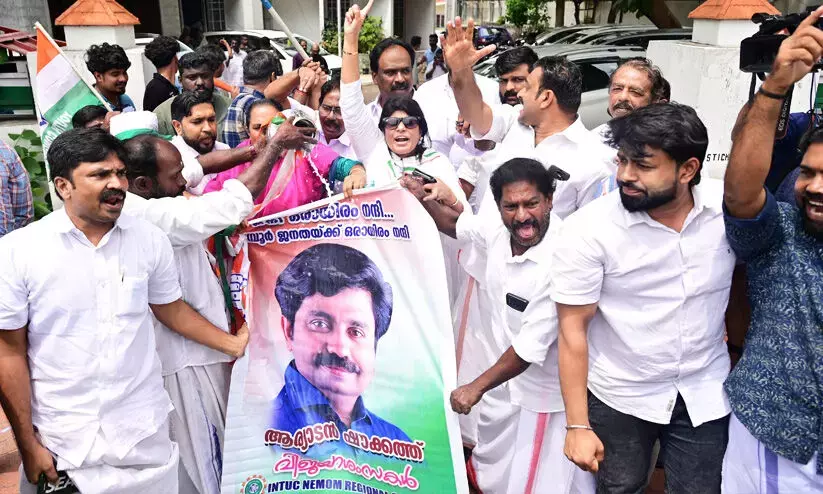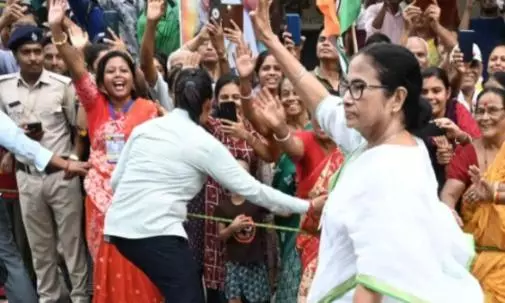
Lesson one of the Nilambur result
text_fieldsIn the Nilambur Assembly by-election in Kerala, United Democratic Front (UDF) candidate Aryadan Shoukath has won with a massive majority of 11,077 votes. In this fiercely contested election, described as the semi-final for the upcoming Assembly election, the UDF wrested control of the constituency from the Left Democratic Front (LDF), which had held it for two consecutive terms. Despite a marathon campaign that saw the Chief Minister and several ministers camping in the constituency for days, the public anger against the two-term rule of the Left Front was clearly reflected in the verdict. Aryadan Shoukath’s thumping majority, combined with the impressive number of votes secured by P.V. Anvar—the independent backed by the Trinamool Congress who stood firmly against ‘Pinarayism’—underscores this further. It was following the resignation of P.V. Anvar, who fought from within against the corruption and misule under Left Front rule and ultimately walked out in frustration, that the Nilambur by-election was necessitated. He pointed to several issues: the rise in criminalisation within the police linked to drug trafficking and smuggling; the growing influence of the Rashtriya Swayamsevak Sangh (RSS) even at the top levels of the police under Left governance—evident even in the BJP candidate's victory in Thrissur; the surrender of even the Chief Minister’s Office to corruption and communal forces; and the collapse of the Forest Department while highland farmers suffered from wild animal attacks and crop loss. Citing these and many other issues, the Left MLA Anvar rebelled against the front and finally exited.
Other than offering flat denials of the allegations, neither the Chief Minister nor the Left Front could offer any convincing reply to these serious allegations, which not only highlighted the government’s administrative failure and misgovernance but also exposed its surrender to corruption and lawlessness. The front’s helplessness in the face of the administrative and political questions raised by Anvar became evident to the voters of Nilambur. The voters realised first hand that the same anti-people stance shown earlier towards the protests of plantation workers and PSC rank holders was now being repeated towards the cries of the high-range farming community. The result shows that the voters of Nilambur used this opportunity to strike hard at such an anti-people regime.
When the LDF failed both to highlight the achievements of its governance and to convincingly explain its failures, Nilambur witnessed the ruling front's resort to opportunistic communal polarisation tactics that ultimately backfired. The Marxist party and the Left Front—who position themselves as the face of secularism and the strongest opposition to communal fascism—shocked voters by engaging in communal propaganda to secure electoral victory. The initial attempt was to claim a kind of ‘paternal’ ownership over Malappuram district and thus attract Muslim votes. However, given the experience of both the Chief Minister and former Chief Ministers repeating the same allegations raised by Hindutva ideologues against the district, the move failed to carry weight. The continued neglect and discrimination experienced under the two-term Left rule—along with the government's silent collaboration with Hindutva forces and the racial 'casteists' who pushed for Muslim marginalisation—was the real reason the Muslim community shifted its support. But the Left Front showed no honesty or introspection in recognising this truth. Instead, the Chief Minister, the party leadership, its media, and the party’s cultural mouthpieces actively tried to portray those who gained Muslim support as part of a communal front. The Left adopted the Sangh Parivar’s narrative that attempted to communalise Muslims—ironically, by leaning on a small CPM-aligned youth group that itself loudly claimed that Jamaat-e-Islami held no significant influence. Not stopping there, even the voices and visibility of backward sections within Muslim organisations were demonised and vilified in an attempt to create inner fragmentation. The voters clearly realised that Chief Minister Pinarayi Vijayan’s 'Jamaat-e-Islami music festival' in Nilambur was a helpless attempt to distract attention from the government’s inability to showcase any real achievements. For anyone still unsure, the nostalgic remarks of the party secretary about the RSS-CPM 'sleeping partnership' made the voters' judgement even easier.
There is no communism without the Stalinism of totalitarianism. But what would be the party's place when it crosses the line in practice was demonstrated by Bengal. If the Left Front, eyeing a third consecutive term, recognises and corrects its failures, its story can continue. As for the United Democratic Front, which rose united and vigilant from previous setbacks, if it can maintain the Nilambur vibe, the comeback could last all the way to power. One thing is certain: no party or front can move forward by mocking and ignoring the common sense of a politically conscious public. That is lesson one of the Nilambur result.




















